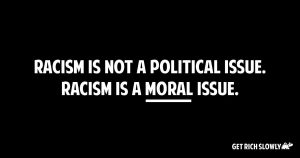How quickly things change.
Last week, the coronavirus (or Covid-19, if you prefer) was a distant problem. It was something other people in other places had to wrestle with. Sure, there was a looming sense that maybe this runaway train was steaming our way, but it still seemed distant enough that maybe it’d stop before it reached us.
Not anymore. Now it’s clear that the coronavirus isn’t just headed to the U.S., it’s already here in our communities.
I’m fascinated by the financial implications of the coronavirus. They’re going to be huge — they’re already huge — but I don’t know who is going to bear the burden or how we, as a society, are going to make sense of this in the long run.
The stock market is tanking, obviously, and will likely continue to tank for some time. But I expect (hope?) that when the dust has settled, things there will largely return to normal.
Yes, I know it’s impossible to make predictions about the market’s direction. But I believe the current movement is largely due to the coronavirus and its immediate implications. When this event has receded into the past — in a few months, say — I expect stocks to regain most of what they lost. Not all, but most. (And again: I could be full of shit. Don’t make any market moves based on what I personally believe will happen. I’m just a random guy behind a keyboard.)
But outside the stock market, there are a whole host of financial implications. We’re entering uncharted territory. I don’t know what to expect, and I don’t think anyone else does either.
Here are some of my questions.
What Happens When Events Are Cancelled?
Many places — including here in Oregon — are banning large gatherings.
What happens to gatherings that have already been scheduled? I expect some events (such as the Portland Timbers match on March 28th) will be postponed. This should have a minimal financial impact on all parties. It simply shifts all of the money-related stuff to a later date.
This has been one of the toughest articles I’ve ever written. As I’m sitting at my desk composing it, new updates to the situation are occurring. Just now, for instance, Major League Soccer announced that it’s suspending the season for thirty days. Rather than re-write as news hits, I’m going to leave the article as it was in the moment I wrote it.
Other events, though, will have to be cancelled. What happens then?
For instance, Kim and I have tickets to see an April performance of The Illusionists at Portland’s Keller Auditorium. This event falls inside the 28-day ban on large gatherings in this state. I highly doubt this event well be re-scheduled. I expect it to be cancelled.
So, what happens when this event is cancelled?
Under normal circumstances — if the event were cancelled for any other reason — I’d expect to receive a refund for the ticket price. But what about now? Will ticket holders still receive refunds? Or will the production company say, “Sorry. This is beyond our control. You’re out of luck.” I can see that happening. And I’m not sure I’d complain.
What about St. Patrick’s Day? I consider this kind of a silly holiday, but it’s a Big Deal to a lot of people.
Perhaps because it occurs in early spring, St. Patrick’s Day fosters events with large crowds. Here in Portland, that means the Shamrock Run, in which 30,000+ people gather in the cold and the rain to run through downtown. That’s been postponed. And Savannah, Georgia, home to the second-largest St. Patrick’s Day parade in the country, just cancelled the event.
When I posted about this on Facebook, one of my friends noted that formal disaster declarations allow insurance claims to be filed. This sounds great, in theory. Disaster declared, so both the production company (or event producer) and potential attendees all get their costs refunded. Yay!
Or is it “yay”?
Doesn’t this simply shift the financial burden to another party? If, as appears increasingly likely, we experience large-scale cancellations, won’t this effectively gut the insurance industry? Do they have enough financial reserves to cover something of this magnitude? I find that unlikely. So, what happens then?
Here’s another real-life dilemma.
The first-ever Financial Freedom Summit is scheduled for May 1st in St. Louis, Missouri. I’m supposed to speak. I haven’t booked my flight yet, and at this point I don’t know whether I should. While St. Louis hasn’t been hit as hard as the West Coast, it’s beginning to feel the effects, and events are being postponed or cancelled.
Will the city (or state) eventually issue a ban on large gatherings? How long will this ban last? I believe we’re at the front-end of the coronavirus vector curve here in the U.S., but how long will it be a concern? Will we still be talking about this in late April and early May? Or will we be done with it in a couple of weeks?
If I had to guess, I’d say things are going to peak by the end of March, and that by the end of April, we’ll mostly be back to normal. But what do I know? Again, I’m just a random guy behind a keyboard.
If I did book my flight and the event were cancelled, would I be able to get my money back? Airlines seem to be making some accommodations, but for how long? For now, I’m holding off on any decisions. (Worth noting: Not everyone has been able to get ticket refunds from airlines. Some are simply out of luck.)
Over at I Will Teach You to Be Rich this morning, Ramit Sethi published an excellent piece on the coronavirus: Panic is bad, but overreaction is good.
What’s Going to Happen to Small Business?
In reality, I’m less concerned about how Big Business is going to weather this storm and more worried about how small businesses are going to hold things together.
Take restaurants, for instance. It’s been a couple of weeks since I dined out — hey, I’m following through with my resolution to spend less on food in 2020! — but I can only imagine that things are slow slow slow. (In hard-hit Seattle, layoffs have already begun.)
To check my hunch, I messaged my friend Kyra Bussanich. Kyra’s the only four-time winner of Cupcake Wars and owns a local gluten-free bake shop. “Have sales slowed at all?” I asked.
“Oh gosh yes,” Kyra answered. “And if things continue, I don’t know if there’ll be a bake shop when this blows over.”
Things are so bad, in fact, that she’s taken a part-time job to make ends meet — and is even considering applying for a full-time job. All this while trying to run her business, a business that’s struggling because of the coronavirus.
https://www.youtube.com/watch?v=c_eI-p4xP4w
At the end of our conversation, Kyra gave me some words of advice for how to help. “If there are artists or small businesses you love,” she said, “I urge you to go buy gift cards to them and when this all blows over, redeem those gift cards.”
GRS reader Christine runs a small business that gives food tours in Nashville. She says that new bookings have stalled. Plus, folks are cancelling travel plans, which means she’s refunding tour tickets. “I had a plan for a recession,” she says. “This is like somebody turned the faucet off.”
So, as bad as things seem for big companies like Apple and United Airlines, they’re even worse for small businesses.
I should note that not all small businesses are being affected. As you know, my family owns a small firm that manufactures corrugated packaging. Custom Box Service is humming right along. In fact, things are busy right now, which is a good sign.
How Will the Coronavirus Affect Personal Finances?
As a personal finance writer, though, my biggest concern during this crisis is the impact it’s going to have on individuals.
I know I just updated my article about what to do when the stock market crashes on Monday — and I stand by my advice there — but there’s more to personal finance than stock-market investing, right?
How is all of this going to affect workers? If Kyra’s Bake Shop has to shut down — even temporarily — she loses income as an entrepreneur, but suddenly her employees are out of work. If my girlfriend’s dental office decides it can’t (or won’t) see patients, she’ll have to go without an income for a while.
Fortunately, Kim has savings. So do I. We can weather the storm. Not everybody can. In fact, most Americans have little (if anything) saved.
If you’re thirty-something with a family, a mortgage, a car payment, and credit card debt, then what happens when you lose your job (or experience a layoff) because people stop coming to where you work?
In a normal economy, this happens constantly on a very small scale. People no longer use typewriters, so a typewriter firm goes out of business and its employees no longer have jobs. But that’s a tiny handful of businesses. Now, today, this is problem is wide-spread and happening all at once.
This isn’t me making stuff up. This is happening to our family and friends right now in the real world.
What happens when many people experience this at the same time? What then?
The Independent, a British publication, recently opined that the coronavirus will bankrupt more people than it kills. I suspect this is true. From the article: “We may look back on coronavirus as the moment when the threads that hold the global economy together came unstuck.” I hope not.
The financial effects won’t simply come from lost wages. Many folks who succumb to the coronavirus in the U.S. — and I truly hope this will number in the tens of thousands, not the hundreds of thousands — could face high medical bills.
For 81% percent of people who contract it, the coronavirus is mild, which means it feels like the flu. For 14% of people, however, it’s severe enough to require hospitalization. Another 5% of those infected suffer symptoms so severe that they need intensive career. (Generally speaking, they need artificial respiration.) And roughly 3% of people die from infection.
While I keep GRS largely politics-free, health care is one rare exception. Our current system is ridiculous: expensive and outmoded. This coronavirus may finally serve as a catalyst for change. Maybe.
What Happens in the Long Run?
I have other questions about what will happen in the long run.
Can the national (and global) economy simply take a two- or three-month break, then resume as normal as if nothing happened? What happens in the meantime? How do we care for our at-risk populations and for those who already struggle to make ends meet?
How do we improve our ability to handle black swan events like this in the future?
Will this crisis change anything about how we live and relate to each other? Is it possible that this could perhaps alleviate some of the partisan bickering we’ve been experiencing in recent years?
It’s my deepest hope that this unprecedented event will draw people together in a way that we haven’t seen in this country for some time. I hope that the spirit of cooperation blossoms and that people and and government and business find solutions to make sure everyone comes happy and healthy and financially secure.
Unfortunately, I don’t think that’s likely to happen.
I don’t have any answers here, obviously. All I have is a lot of questions. I suspect that’s true for everyone. For once, this really does seem like a case of “this time is different”.
Lifehacker has published a guide on what to do if the coronavirurs is affecting your finances.






